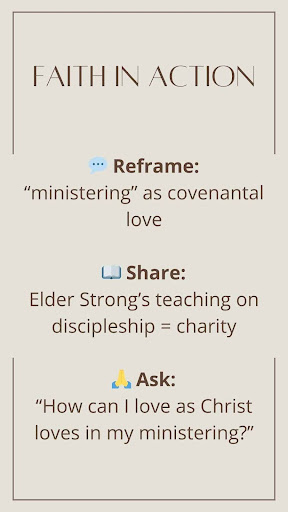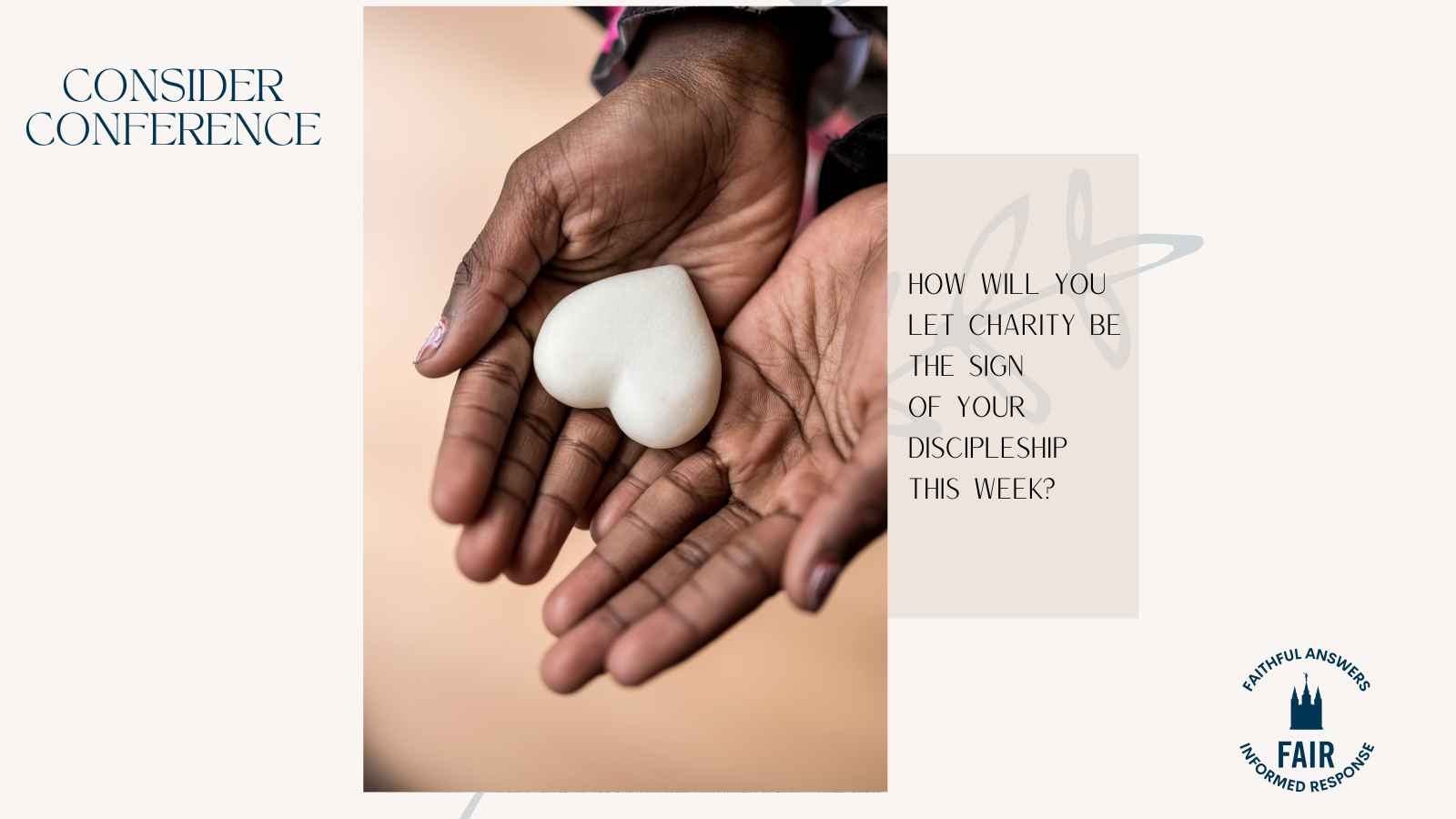
Elder Michael B. Strong, “Charity—a Sign of True Discipleship”
“By this shall all men know that ye are my disciples, if ye have love one to another.” (John 13:35)
In his April 2025 General Conference address, Elder Michael B. Strong taught that the destination of discipleship is not based on belief or outward conformity, but transformation: to literally become as Jesus Christ is. The unmistakable sign of that transformation is charity—the pure love of Christ, expressed in deliberate, covenantal love for others.
But critics sometimes claim that discipleship in the Church looks like “checklist religion.” Ministering may be done to meet a quota. Kindness may be offered for appearance’s sake. Rules may be followed for cultural conformity.
Elder Strong’s message provides an answer: true discipleship is not performative. It is charity—love in action—that transforms us into Christ’s likeness and reveals the depth of covenant commitment.

Common Criticism: Isn’t This Just ‘Checklist Religion’?
The critique often arises that Church service and discipleship are shallow or rule-bound—reduced to outward behaviors with little inner meaning. Some see ministering visits, callings, or covenant keeping as legalistic “busywork” rather than genuine discipleship.
Elder Strong’s answer to this criticism is simple: the true sign of discipleship isn’t outward performance but inward transformation through charity.
What is charity?
Charity is the pure love of Christ (Moroni 7:47; 8:17). It is not a fleeting kindness or polite gesture, but a divine, enduring love that moves us to act in compassion and lift others as the Savior did.
Charity is inseparably tied to faith and hope—and without it, we are nothing (Moroni 7:44–46; 10:20). It suffers long, is patient and kind, and it never fails (Moroni 7:45–48). It is both commandment and covenant, the defining attribute of true discipleship: “ye shall have charity, for charity never faileth” (2 Nephi 26:30).
It is the sanctifying bond that brings us nearer to Christ, enabling us to be “full of love towards all men, and to the household of faith” (Alma 7:24). Ultimately, charity is the sign that we are His—love in action that endures forever and transforms us into His likeness (Ether 12:34, 37).
Fallacy at Work: This criticism reflects the Attribution Error
Attribution Error is the tendency to explain someone’s behavior by assuming shallow or negative motives, while overlooking deeper context or external factors.
In this case, critics assume Church members minister or serve to “check a box,” ignoring the covenantal love and unseen compassion that often motivate discipleship. Many unseen acts of compassion, sacrifice, and covenantal love are evidence that discipleship in the Church is far more than performance.
Solution: Charity isn’t about surface-level “niceness.” It is the very nature of Christ made manifest in us—selfless, covenantal love that leads to action, endures forever, and identifies us as His disciples.
“Charity, like faith, leads to action.” 1
Living Apologetics: Ministering as Covenant Love
A common example of this criticism is ministering (previously home or visiting teaching). To some, it can feel like a shallow checklist—“just niceness” to fulfill an assignment.
Elder Strong’s reminder reframes ministering: true discipleship means embodying the love of Christ for that person – not just to “get it done”. When ministering is covenantal love in action, it becomes the very evidence that we are Christ’s disciples.
Practical Apologetic Use:
- If someone says: “Ministering is just busywork—it doesn’t really change lives.”
- You can respond: “Ministering isn’t meant to be a task—it’s an invitation to live charity as Christ did. The Savior showed compassion, noticed unspoken needs, and helped people forward spiritually. That’s what covenantal ministering looks like.”
Ways to Apply Today:
1️⃣ Pay compassionate attention. Elder Strong pointed to the Savior’s way of noticing unspoken needs.Most of the time, if you ask someone directly if you can help, they will say “no.” But the Spirit can teach us what others are feeling and needing if we are willing to notice. Charity means not being afraid to act on those quiet impressions.
2️⃣ Act with covenantal depth. Choose one ministering assignment this month where you intentionally go beyond surface kindness—help, invite, or encourage in a way that mirrors the Savior’s compassion.
Keep This Talk With You
General Conference is meant to be more than a weekend experience—it is an invitation to live differently after the closing prayer. Elder Strong’s message reminds us that discipleship is deliberate, and its defining sign is charity, the pure love of Christ.
That means charity is not a momentary feeling or a task to check off. It is a way of seeing and serving others that changes both them and us. When we notice unspoken needs, act on promptings, and approach ministering as covenantal love instead of convenience, we carry this talk with us into our daily lives.
This week, try one small step:
- Pray to recognize someone who needs compassion.
- Pay attention to promptings, even if they seem small.
- Act in a way that reflects covenant love, not just surface kindness.
“Charity … is the pure love of Christ.” (Moroni 7:47)
As you act, you’ll find that charity not only blesses others but transforms you—helping you to become a true disciple of Jesus Christ, whose life is marked by love in action.
How will you let charity—not convenience or comfort—be the sign of your discipleship this week?

The Consider Conference series by FAIR offers an in-depth look at recent General Conference talks to help members of the Church of Jesus Christ of Latter-day Saints navigate common questions, misunderstandings, and criticisms. Each post provides doctrinal insights, historical context, and practical ways to apply gospel principles in everyday conversations. Through this series, we hope to equip readers with faith-promoting resources that encourage thoughtful reflection, respectful dialogue, and a stronger foundation in gospel truths, fostering both personal conviction and meaningful discussions with others.
The post Charity: The Sign of True Discipleship appeared first on FAIR.
Continue reading at the original source →



